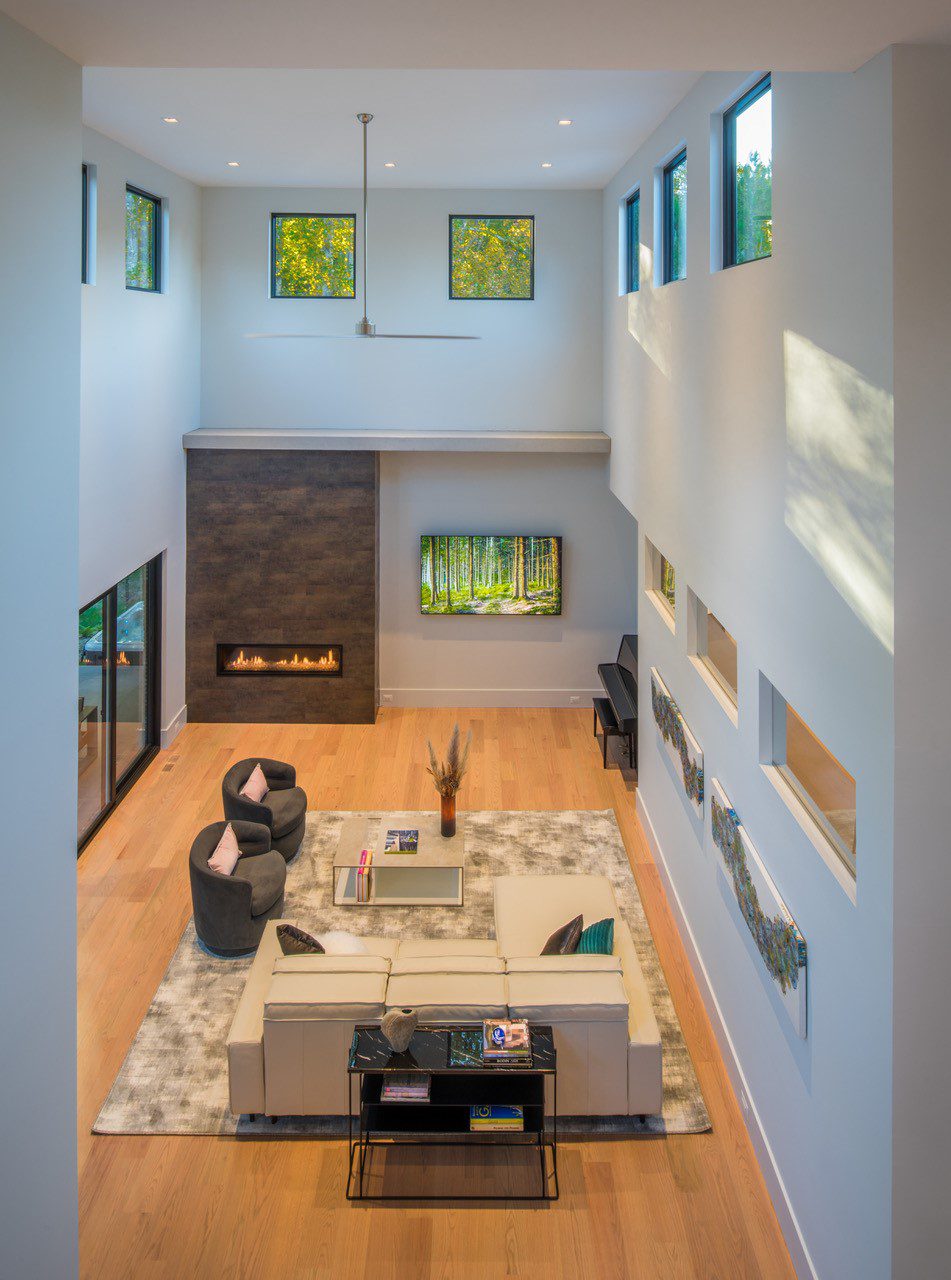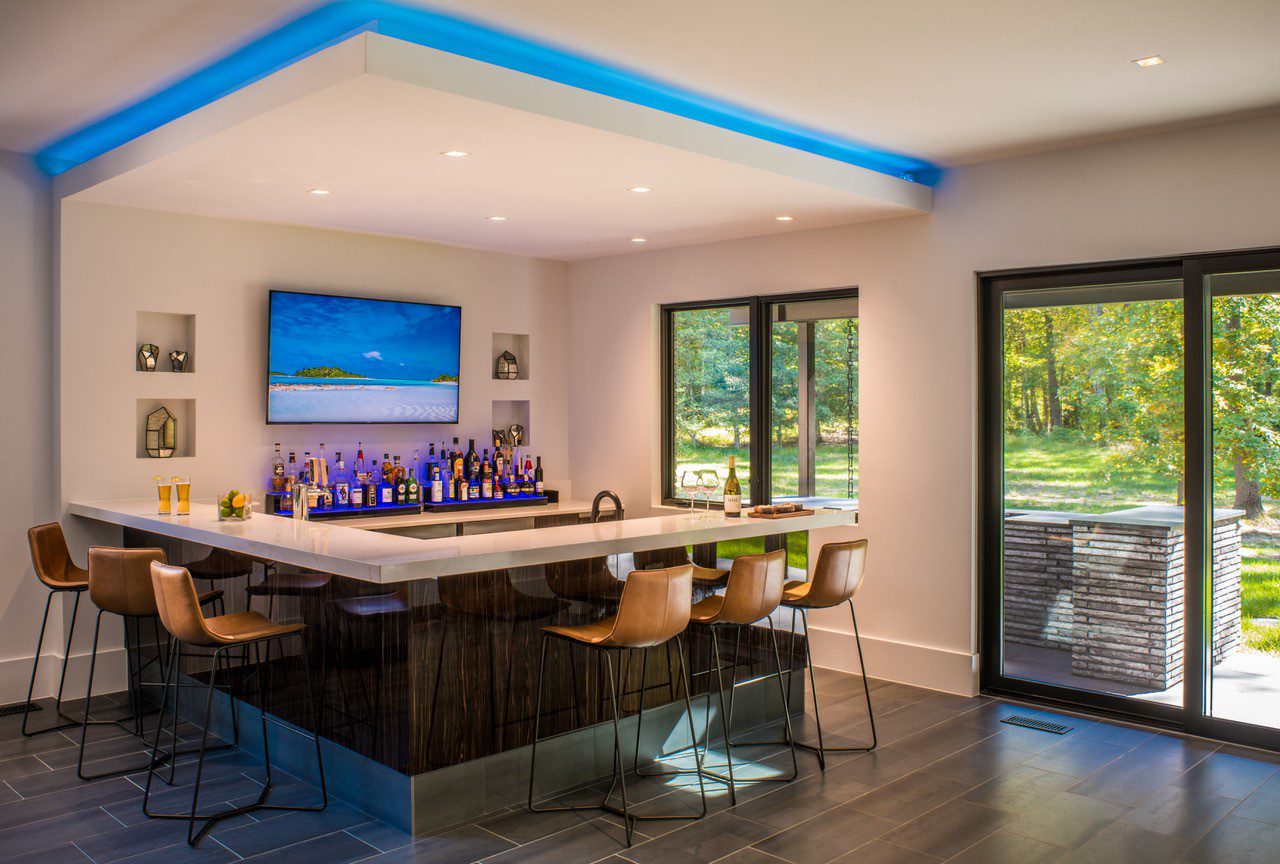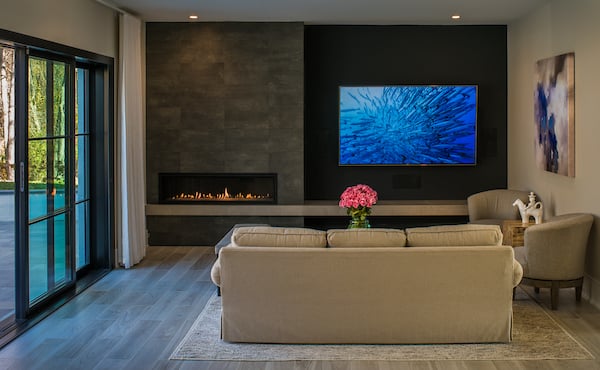

Once a coveted feature in luxury homes, home theaters are now facing a surprising decline. The allure of a dedicated space, equipped with state-of-the-art audio and visual systems, has been overshadowed by emerging trends and lifestyle changes. Homeowners are increasingly finding these spaces less relevant to their daily lives, leading to a notable shift in modern home design preferences. This change reflects a broader trend in home entertainment, where flexibility and multifunctionality are becoming more valued than specialized, single-use rooms.
At AV Architects + Builders, we have designed and built modern custom homes for clients in the Northern Virginia area for over 20 years. Our expertise in creating versatile and adaptive living spaces allows us to understand and address the changing preferences of homeowners. We recognize the importance of designing homes that not only meet the current needs of residents but also anticipate future lifestyle shifts. Our approach involves integrating innovative solutions that cater to a wide range of activities, ensuring that every space within the home is both functional and enjoyable.
In this article, we will explore the factors contributing to the decline of home theaters and examine how modern homes are being reimagined to accommodate new forms of entertainment and leisure. We promise to provide insights into the evolving landscape of home design, highlighting alternative solutions that align with contemporary lifestyles. Whether you are planning to build a new home or remodel an existing one, this article will offer valuable perspectives on creating spaces that are both timeless and adaptable to future trends.
The Rise and Fall of Home Theaters
In the early 2000s, having a home theater was a coveted feature in luxury homes. It represented the pinnacle of in-home entertainment, with large screens, surround sound systems, and plush seating, offering an immersive cinematic experience. Fast forward to today, and the demand for these dedicated spaces has significantly waned. The once sought-after home theater rooms are being replaced by more versatile living spaces. This shift reflects a broader change in how we view and use our living spaces, prioritizing flexibility and multi-functionality over single-purpose rooms.
Changing Viewing Habits
One of the primary reasons for this shift is the change in media consumption habits. Streaming services like Netflix, Hulu, and Amazon Prime have revolutionized how we consume media, offering a plethora of content at our fingertips. The need for a singular, dedicated space for watching movies or television has diminished as streaming content has become more accessible throughout the home. People now prefer the convenience of watching their favorite shows and movies in various rooms, not confined to a single space. This change in viewing habits has played a significant role in the decline of traditional home theaters.
The Rise of Smart, Multi-Use Spaces
As technology has advanced, so has the flexibility of home design. Smart homes now integrate entertainment systems throughout the house, making it possible to enjoy media in any room. This integration has led to a preference for multi-use spaces over single-purpose rooms like home theaters. Homeowners are now designing spaces that can adapt to various activities, whether it's watching a movie, hosting a party, or having a quiet reading session. This trend towards multi-functional spaces reflects a desire for homes that can evolve with our changing needs and lifestyles.
The Influence of Mobile Devices
The proliferation of mobile devices has also played a role in the decline of home theaters. Tablets, laptops, and smartphones allow for a more personal and intimate viewing experience, and many people prefer the convenience of watching their favorite shows on these portable devices. This shift towards personal viewing experiences has reduced the need for a dedicated home theater. The flexibility and convenience offered by mobile devices have significantly influenced how we consume media, leading to a reevaluation of how we design our entertainment spaces.
 AV Architects + Builders, The Inside Out Home, Photo by Maxwell Mackenzie
AV Architects + Builders, The Inside Out Home, Photo by Maxwell Mackenzie
The Shift to Social and Functional Spaces
Emphasis on Social Interaction
Modern homeowners are increasingly valuing spaces that promote social interaction and togetherness. Rather than a secluded home theater, there's a growing preference for open living areas where family and friends can gather, interact, and enjoy various activities together. These communal spaces are designed to be flexible, accommodating different forms of entertainment and social gatherings. The focus is on creating environments that foster connection and engagement, reflecting a shift towards more inclusive and versatile living spaces.
Versatile Entertainment Areas
Instead of dedicated home theaters, many are opting for versatile entertainment areas that can serve multiple purposes. These spaces can easily transition from a cozy family movie night to a lively game room or a quiet reading nook, depending on the occasion. This versatility is a key aspect of modern home design, reflecting a desire for spaces that can adapt to our diverse and dynamic lifestyles. Homeowners are looking for practicality and functionality, choosing designs that can accommodate a wide range of activities and preferences.
 AV Architects + Builders, The Architect House, Photo by Maxwell Mackenzie
AV Architects + Builders, The Architect House, Photo by Maxwell Mackenzie
The Future of Home Entertainment
Personalized Entertainment Experiences
The future of home entertainment is leaning towards personalized experiences. This means creating spaces that cater to the diverse preferences of each family member, whether it's gaming, reading, or watching movies. The emphasis is on creating environments that are adaptable, comfortable, and reflective of individual tastes and needs. This approach to home entertainment prioritizes personalization over standardization, offering a more tailored and enjoyable experience for everyone in the home.
Sustainable and Minimalist Design
There's also a growing consciousness about sustainable and minimalist living. This mindset favors functional spaces that don't require excessive resources or maintenance, further contributing to the decline of traditional home theaters. Homeowners are increasingly seeking designs that are not only aesthetically pleasing but also environmentally responsible and easy to maintain. This trend towards sustainability and minimalism is reshaping how we think about home design, including our entertainment spaces.
Embracing the New Era of Entertainment in Modern Homes
The decline of traditional home theaters in modern homes marks a significant shift in home entertainment preferences. This evolution reflects the changing dynamics of how we engage with media and utilize our living spaces. The transition from dedicated home theaters to more versatile and multifunctional areas aligns with contemporary lifestyles, where adaptability and personalization are key.
It's important to remember that this shift doesn't diminish the joy of home entertainment; rather, it opens up new possibilities for integrating entertainment into our daily lives. The move towards spaces that can serve multiple purposes – from a cozy movie night to a lively social gathering – reflects a more holistic approach to home design.
For those considering home renovations or new constructions, it's advisable to think beyond the traditional home theater concept. Explore designs that offer flexibility, integrate smart technology, and cater to a variety of activities. This approach not only ensures that your home remains relevant and functional in the years to come but also enhances the overall quality of your living experience.
In conclusion, the decline of home theaters is not an end to home-based entertainment but a transformation towards more dynamic, adaptable, and personalized spaces. This change is an opportunity to reimagine how entertainment fits into our homes and lives, creating spaces that are not only technologically advanced but also deeply attuned to our personal preferences and lifestyles. Embrace this new era of home entertainment, where every room has the potential to be a stage for life's most enjoyable moments.
Sofia Alonso is currently the Content Manager at AV Architects + Builders, a family-owned architect-led design-build firm specializing in creating modern style homes for clients in Northern Virginia. Having been with the company since 2019, Sofia has demonstrated a strong commitment to the firm's ethos of providing high-end, luxury living experiences. Sofia holds a Bachelor of Science in Interdisciplinary Studies with a focus on Writing from the University of Virginia. With Sofia contributing to the firm's content strategy, clients can look forward to insightful, educational content that perfectly aligns with the luxurious, high-quality living experiences that AV Architects + Builders is renowned for.
Topics:




